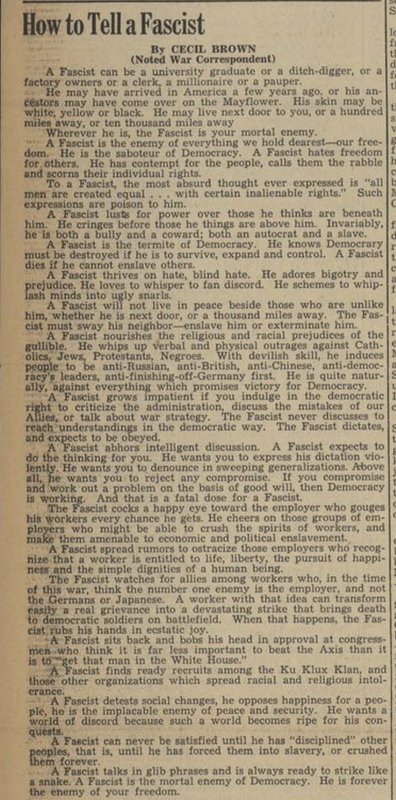Minorities of Camp Howze
"To a Fascist, the most absurd thought ever expressed is "all men are created equal...with certain inalienable rights."
"A fascist is the enemy of everything we hold dearest--our freedom ... hates freedom for others ... has contempt for the people, calls them the rabble and scorns their individual rights ... lusts for power over those he thinks are beneath him ... thrives on hate ... adores bigotry and prejudice ... will not live in peace beside those who are unlike him ... nourishes the religious and racial prejudices of the gullible ... never discusses to reach understandings in the democratic way ... finds ready recruits among the Ku Klux Klan and those other organizations which spread racial and religious intolerance ... detests social changes ... is the mortal enemy of Democracy. He is forever the enemy of your freedom." -- Cecil Brown, War Correspondent
In March 1944, three years after America declared war against the fascist threats from overseas, the need for unity among its people remained an elusive goal while millions of American citizens continued to suffer under cruel policies of racial hierarchy within its civilian and military sectors. Despite the War Department's 1940 "Protective Mobilization Plan," which aimed to increase the military's employment and leadership opportunities for Black Americans, relatively few people with the power to ensure its implementation fully embraced its inclusive ideas for strengthening America's defensive capabilities at home and abroad. Instead, white supremacists clung to their prejudices and pseudo-scientific beliefs about race and insisted on keeping America divided at any cost. While the country mobilized for war by building the necessary infrastructure for a massive increase of its armed forces, strategies for segregating Black Americans remained a constant priority that undermined President Roosevelt's claims of "righteous might" when, on December 8, 1941, he assured the nation of an absolute victory following Japan's attack on Pearl Harbor.
Though the U.S. Armed Forces recognized the immediate need for new military installations, auxiliary support services, and millions of personnel, they refused to offer equal opportunities for employment within its branches. Instead, they maintained strict policies of segregation that essentially identified Black service members as the military's least desirable minority. By locating training facilities like Camp Howze in areas of the country where citizenship of Black Americans was most limited, the U.S. Army endorsed the policies of its surrounding communities and isolated its Black troops accordingly. Regardless of any traditionally recognized differences among Americans of various origins, ethnicities, and faiths, service members of all minority statuses except those considered Black were included among the majority and granted some degree of privilege denied to Black service members who were permanently designated as "others" and relegated to second-class status.
Camp Howze was not unique with its unnatural separation of America's defenders. Like much of the country and all the southern states that hosted military men and women, the Camp Howze authorities created and reinforced racist policies that threatened the nation's security. At the same time, it worked day and night for its defense. Though this hypocrisy did not go unnoticed by all Americans, Cecil Brown's anti-fascism message printed in the camp's weekly newspaper, the Camp Howze Howitzer, appeared to go unheeded as the enemy of Democracy was present at Camp Howze and dominated the lives of Black Americans who served there.
